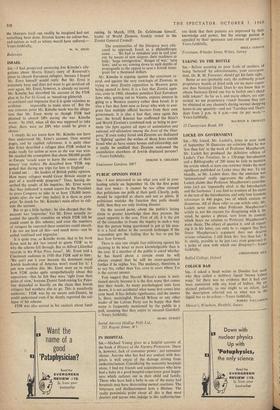Old and s q uare, it makes a committed critic feel; rather,
maybe, as the Thirties intellectuals Must have felt when they suddenly found them- selves talking to grown-up people who didn't care about Spain : who'd missed it. 'The belief m°r often it looks like a pretence,' says Miss Houston 'that one can somehow write a sounder review be of a film by keeping to style and method, not bothering to work out what its motive force may be, is surprisingly influential': it cer- y is, as any critic's fan-mail tells him. And :hsuspect, portmanteau word sums up this Widest business of critical commitment: in its thiest sense, politics. If politics means some- 8 much Much wider than systems of government, lt means an attitude to others, then the com- ninited approach is political; and because, as Miss euston says, 'Cinema is about the human situa- tion, not about "spatial relationships,"' the un- ummitted approach seems lunatically narrow. A wen who says ,he has no politics might just as ll admit airily to having no moral sense, no TeleVISIOn By PETER THE friend who re- marked that I seem to have viewed little of late has rather missed the point of viewing at all. Selectivity is a word as relative as patriotism. The problem of review- ing television is that there is so much to write about. For instance, the fact that the funniest 1)11 Plain play of the week was by hi Plautus and pet out by BBC Schools as a morn- iog,rePeat, is surely an admirable peg on which 11ang a few reflections on the plus ca change vg.ture c, of farce, with reference to the Scapin- iat character of the old-time, quick-wit valet. of 1 Of have to stipulate old-time, quick-wit because pi Cronin: and talking of that, will Tonight nst jsease repeat the Derek Hart take-off everyone interest in others, and no connection with the world he lives in: it comes to that. And as your politics are reflected in everything you say, do, believe in, like and hate, in all your judgments, even of the most unpolitical-looking things, and all your reactions; as they're as plain as the nose on your face you can no more bury them, as a critic, than you can bury (say) your style, which is as personal as handwriting, and just the same mixture as politics is of your own nature, your surroundings, and the influences on your past. The films: The Time Machine (director: George Pal; 'A' certificate): up-to-date Wells, and a thorough curate's egg. Natural phenomena cunningly dealt with and all goes well till the late humans (Eloi) and sub-humans (Morlocks) start calling things like: 'C'mon, let's go!' Then science fiction fades into purest Hollywood and laughs break all tension and belief. High Time (director: Blake Edwards; 'U' certificate): likeable but drawn-out romp with Bing Crosby on the campus and some rather autobiographical-sounding satire about second marriage, etc. Frenzied pace and clever camera `business': and Fabian, the teenagers' sender, indistinguishable from Cliff Richards.










































 Previous page
Previous page